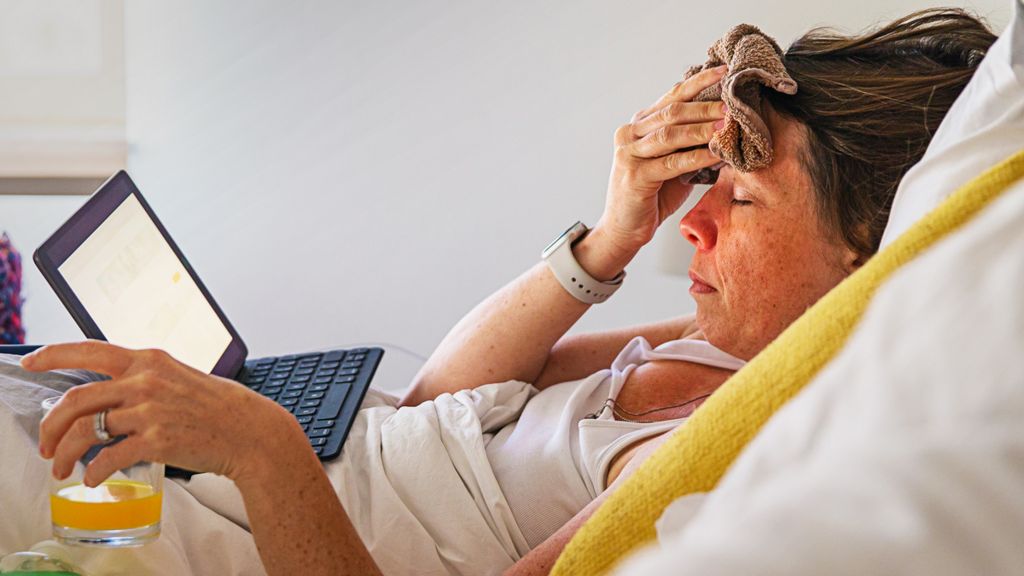Who can get a free flu jab this winter?
- Published

Health officials are urging people to get a flu vaccination this autumn, as flu starts to spread at a higher level than in a normal year.
Many southern hemisphere nations had their worst flu season for years, after the ending of Covid restrictions meant people mixed much more, and experts predict the same is likely to happen in the UK.
Having a vaccine will stop many people from becoming seriously ill, including children, and ease pressure on the health service.
Who will get a free flu jab?
In England, the flu vaccine, external is free for frontline health or social care workers, and those who:
are 50 and over
have certain health conditions
are pregnant
are in long-stay residential care
are the main carer for an older or disabled person
Adults aged 65 and over should be offered a vaccine with an extra ingredient that triggers a stronger response from the immune system.
A nasal spray form of the vaccine, external, which is more suitable for children, is being offered to:
2- and 3-year-olds
all primary school children
secondary school children in years 7, 8 and 9
children aged six months to 17 years with long-term health conditions
The oldest, youngest and the most vulnerable are being offered a jab first before other groups because they are at higher risk of complications.
If there's enough supply, pupils in years 10 and 11 will also be offered a dose.
For most people, the flu vaccine can be accessed via GPs, midwives and schools. Eligible patients can also book an appointment at a pharmacy.
About 26 million people in the UK are also being offered a booster jab against Covid. They may be offered flu and Covid jabs at the same time.
What about free flu jabs in the rest of the UK?
Health officials in Scotland, external, Northern Ireland, external and Wales are offering jabs to broadly similar groups of people - with some variations.
Children are given the flu vaccine as a nasal spray
Can I pay for a flu jab?
Anyone can pay to have a private flu vaccine at pharmacies or some supermarkets, at a cost of about £15.
However, officials say vaccine supplies will be prioritised for those at greatest risk who are entitled to a free jab via the NHS.
The best time to get vaccinated is between late September and end of November because the flu season peaks in January or February, but it's still worth having it later.
How bad is flu and how long does it last?
For many, flu typically lasts about two weeks, external, and clears up on its own.
However, it can be very serious - particularly for older adults, very young children and people with underlying health conditions.
Pregnant women are advised to have the flu vaccine as soon as it becomes available, regardless of their stage of pregnancy.
Annual flu deaths vary each year, depending on the strain and other factors.
More than 24,000 people died in England from flu and pneumonia in 2019
Symptoms - is it flu or Covid?
It can be hard to tell if you have flu or Covid as the symptoms can be similar, including:
fever
cough
tiredness
Some people also experience muscle-aches, a headache, sore throat or diarrhoea and vomiting with flu.
But these symptoms can be caused by other common winter viruses too.
Both flu and Covid can be spread before people have symptoms.
Social distancing reduced the spread of the flu last winter which has weakened people's immunity
Can I get Covid and flu at the same time?
Yes, in which case you are more likely to be seriously ill.
Research shows those infected with both viruses are more than twice as likely to die as someone with Covid alone.
What are the side-effects of the flu jab?
Most are mild and only last a day or two. They can include a slightly raised temperature, muscle-ache and a sore arm.
Allergic reactions are rare, but you should avoid the vaccine if you have previously had a bad response to a flu vaccine.
Those with egg allergies should ask their pharmacist or GP for a low-egg or egg-free vaccine.
It is best to avoid the vaccine if you are ill with a high temperature, and re-book for when you are fully recovered.